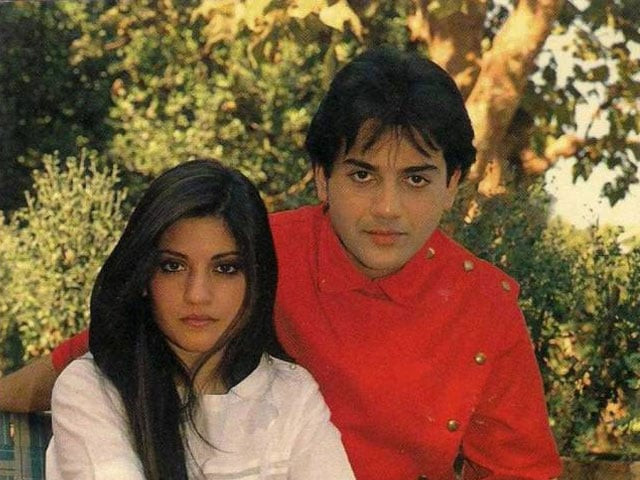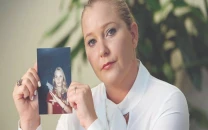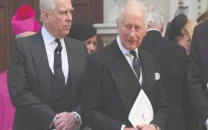From 'Disco Deewane' to 'Camera Camera': A musical timeline of Nazia and Zoheb Hassan
The soundtrack to the siblings biopic has been revealed.

The soundtrack to the siblings biopic has been revealed
PHOTO: FILE
Zoheb Hassan recently revealed in an interview with Mumbai Mirror, "I will sing my parts," admitting that he'd love their mentor Biddu, who launched Nazia in the 1980 movie Qurbani, to appear in the film too but he has retired from the business. "However, he is agreeable to lend a hand with the score."
The movie's soundtrack "will have the earlier hits like Disco Deewane, Dosti, Boom Boom, Tere Quadmon, and also some new tracks and unreleased songs," revealed Zoheb.
Bollywood film on Nazia, Zoheb Hassan in the works
1. Aap Jaisa Koi Mere Zindagi Mein Aaye
Naiza began singing with Zoheb for musical shows in Karachi in late 1970s. In 1976, the duo appeared in Pakistan’s first English language film Beyond The Last Mountain as extras in a song sequence.
The siblings then worked together on non-film albums in the 1980s, but what kicked off their music career was the song Aap Jaisa Koi Mere Zindagi Mein Aaye in Feroz Khan’s crime drama Qurbani.
According to Sroll.in, Nazia was 15 years old when Biddu met her on Feroz Khan's recommendation at her apartment in London. The massive success of Aap Jaisa Koi bagged Nazia a Filmfare Best Female Playback award, and her career as a star of the disco-themed club song was set.
Zoheb Hassan to release seventh album
2. Disco Deewane
The success of Aap Jaisa Koi led to another collaboration with their mentor, Biddu. He was approached by the music label HMV to record its first non-film album with Nazia, as noted in his memoir Made in India.
Biddu asked Zoheb to compose a few tunes too, and the 16-year-old singer came up with three songs. The initial titles under consideration were Disco Party and Music Ke Deewane.
Disco Deewane was released in April 1981 and sold 100,000 copies on the first day of its release, Biddu writes. The songs played not only across the Indian subcontinent and within the South Asian population in the UK, but also the US, the Caribbean, and also in Brazil, South Africa, Russia and Indonesia.
3. Boom Boom
Biddu then came up with a movie plot about a young man who becomes a successful singer. Star (1982) was directed by Vinod Pande. Featuring actors Kumar Gaurav and Rati Agnihotri, Star had eight tracks by Biddu, all sung by the Hassan siblings.
The soundtrack was then released as the album Boom Boom, the title song of which was another smash hit.
Prince of Pakistani pop regains relevance
4. Young Tarang
The siblings collaborated again for an album in 1984 called Young Tarang. Their music videos were popular in Pakistan, thus catching the attention of President Zia-ul-Haq.
Zia, who had ordered public TV and radio networks to stop playing “un-Islamic” disco music, called the siblings to his residence in Islamabad and lectured them on the appropriate behaviour to be displayed while performing their songs. His talk with them included avoiding physical contact between male and female singers and sticking to the local dress code.
Zia lifted the ban after the Hassan siblings exhibited the appropriate behaviour based on his advice and dressed modestly in subsequent music programmes.
5. Hotline and Camera Camera
Nazia and Zoheb Hassan released two more albums, Hotline (1987) and Camera Camera (1992), after which Nazia retired from singing. The young singer died of lung cancer in 2000 at the age of 35.
Zoheb Hassan, always the weaker of the two singers, tried to re-establish himself as a solo artist in the late ’90s and the early 2000's. In 2006, he released the album Kismat.
Although Zoheb's singing career never really took off after his sister's death, he is still popular and highly respected in the music industry today. Proof of which is his appearance on Coke Studio, in which he sang Chehra from Young Tarang.
"Nazia and I were a team and I was too shattered after her death to continue to make music. I detached myself from showbiz completely until I was convinced by Strings to perform for Coke Studio," he says.
The biopic, reveals Zoheb, will offer a "behind the scenes" look into their lives and career, and also give an interesting insight into the workings of the music industries at home and abroad in the '80s and '90s.
"Even though physically she was really petite, Nazia was one of the strongest persons I've known. This will come through in the film," he promises.



















COMMENTS
Comments are moderated and generally will be posted if they are on-topic and not abusive.
For more information, please see our Comments FAQ